8. Sınıf İngilizce Ders Kitabı Sayfa 124-125-126-127-128-129-130-131. Cevapları MEB Yayınları
Natural Forces Ünitesi Cevapları
10. Ünite Natural Forces 8. Sınıf İngilizce Ders Kitabı Sayfa 124-125-126-127-128-129-130-131 Cevapları MEB Yayınları
8. Sınıf İngilizce Ders Kitabı Sayfa 124 Cevapları MEB Yayınları
Activity 1 (1. Aktivite)
Match the verbs with their definitions.
Çeviri: Fiilleri tanımlarıyla eşleştirin.
Cevap:
(4) a to become greater in amount, number or value etc.
(5) b to make something happen
(2) c to damage something badly
(1) d to create something
(3) e to add dirty or harmful substances to land, air, water etc.
(6) f to finish a supply of something
Activity 2 (2. Aktivite)
Read the news report. Why do we have to save the nature?
Çeviri: Haber raporunu okuyun. Neden doğayı kurtarmak zorundayız?
Cevap: Because nature does not need us, we need nature. Nature is one of our living resources. (Çünkü doğanın bize değil, bizim doğaya ihtiyacımız var. Doğa, yaşam kaynaklarımızdan biridir.)
Activity 3 (3. Aktivite)
Read the news report again. Answer the following questions.
Çeviri: Haber raporunu tekrar okuyun. Aşağıdaki soruları cevaplayın.
1. Why does the nature die out?
Çeviri: Doğa neden ölüyor?
Cevap: People use resources irresponsibly. (İnsanlar kaynakları sorumsuzca kullanıyor.)
2. How do people destroy the nature?
Çeviri: İnsanlar doğayı nasıl yok eder?
Cevap: They cut down the trees, pollute the environment, etc. (Ağaçları kesiyorlar, çevreyi kirletiyorlar vs.)
3. What happens if people destroy forest?
Çeviri: İnsanlar ormanı yok ederse ne olur?
Cevap: The rate carbon dioxide in the atmosphere will be higher than normal. (Atmosferdeki karbondioksit oranı normalden daha yüksek olacaktır.)
4. What is the result of high carbon dioxide rate?
Çeviri: Yüksek karbondioksit oranının sonucu nedir?
Cevap: Increase in the temperature. (Sıcaklık artışı.)
5. What should people do to save the nature?
Çeviri: İnsanlar doğayı kurtarmak için ne yapmalı?
Cevap: Save resources and use recyclable products. (Kaynakları koruyun ve geri dönüştürülebilir ürünler kullanın.)
8. Sınıf İngilizce Ders Kitabı Sayfa 125 Cevapları MEB Yayınları
L – 6 Lesson
Activity 1 (1. Aktivite)
How eco-friendly are you? Tick (✓) the questionnaire.
Çeviri: Ne kadar çevre dostusun? Anketi işaretleyin (✓).
Activity 2 (2. Aktivite)
Share the results in the classroom.
Çeviri: Sonuçları sınıfta paylaşın.
8. Sınıf İngilizce Ders Kitabı Sayfa 126 Cevapları MEB Yayınları
A – 10 Assignment
Visual Dictionary
Keep expanding your visual dictionary by including new vocabulary items from this unit. Complete and display it.
Çeviri: Bu üniteden yeni kelime ögeleri ekleyerek görsel sözlüğünüzü genişletmeye devam edin. Tamamlayın ve gösterin.
S – 10 Self-assessment
How well can you do these things? Tick (✓) the chart.
Çeviri: Bunları nasıl bu kadar iyi yapabiliyorsun? Grafiği işaretleyin (✓).
I can understand the main points of TV news about natural forces and disasters. (Doğal olaylar ve afetlerle ilgili televizyon haberlerinin ana hatlarını anlayabilirim.)
I can express predictions about natural forces and disasters. (Doğal güçler ve afetler hakkında öngörülerde bulunabilirim.)
I can understand specific information in texts about natural forces and disasters. (Doğal güçler ve afetlerle ilgili metinlerdeki belirli bilgileri anlayabilirim.)
I can write a paragraph about results of natural forces and disasters. (Doğal olaylar ve afetlerin sonuçları hakkında bir paragraf yazabilirim.)
8. Sınıf İngilizce Ders Kitabı Sayfa 127 Cevapları MEB Yayınları
1. Match the words/ phrases with the pictures. (There are two extra words.)
Çeviri: Kelimeleri/ifadeleri resimlerle eşleştirin. (Ekstra iki kelime var.)
Cevap:
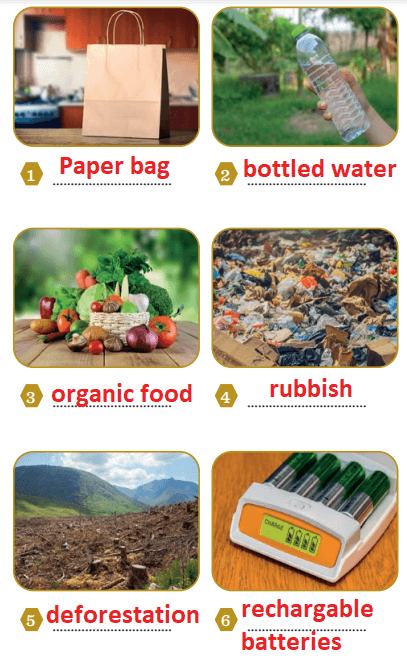
2. Put the letters into the correct order and complete the sentences.
Çeviri: Harfleri doğru sıraya koyun ve cümleleri tamamlayın.
Cevap:
1. A powerful _hurricane_ (ranhriecu) is approaching to the coast of Florida.
2. Man made _drought_ (gtohdur) is threatening the future of the World.
3. _Tsunami_ (santimu) waves hit the Japan in 2011.
4. A destructive _avelanche_ (vancaleha) destroy some Alpine villages.
5. An active _volcano_ (nacvolo) may erupt at any time.
3. Read the report. Tick (✓) the predictions about the future.
Çeviri: Raporu okuyun. Gelecekle ilgili tahminleri işaretleyin (✓).
Cevap:
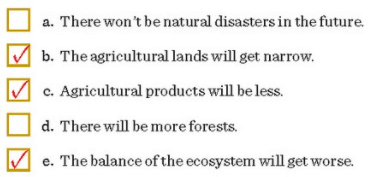
4. Read the text. Complete the table.
Çeviri: Metni okuyun. Tabloyu tamamlayın.
Cevap:
Disaster (s) : Erthquake, tsunami.
Country : Japan.
Date : Mrch 11, 2011.
Local time : 2.46 p.m.
Magnitude : six miles.
8. Sınıf İngilizce Ders Kitabı Sayfa 128 Cevapları MEB Yayınları
Activity 1 (1. Aktivite)
Solve the puzzle.
Çeviri: Bulmacayı çözün.
Cevap:
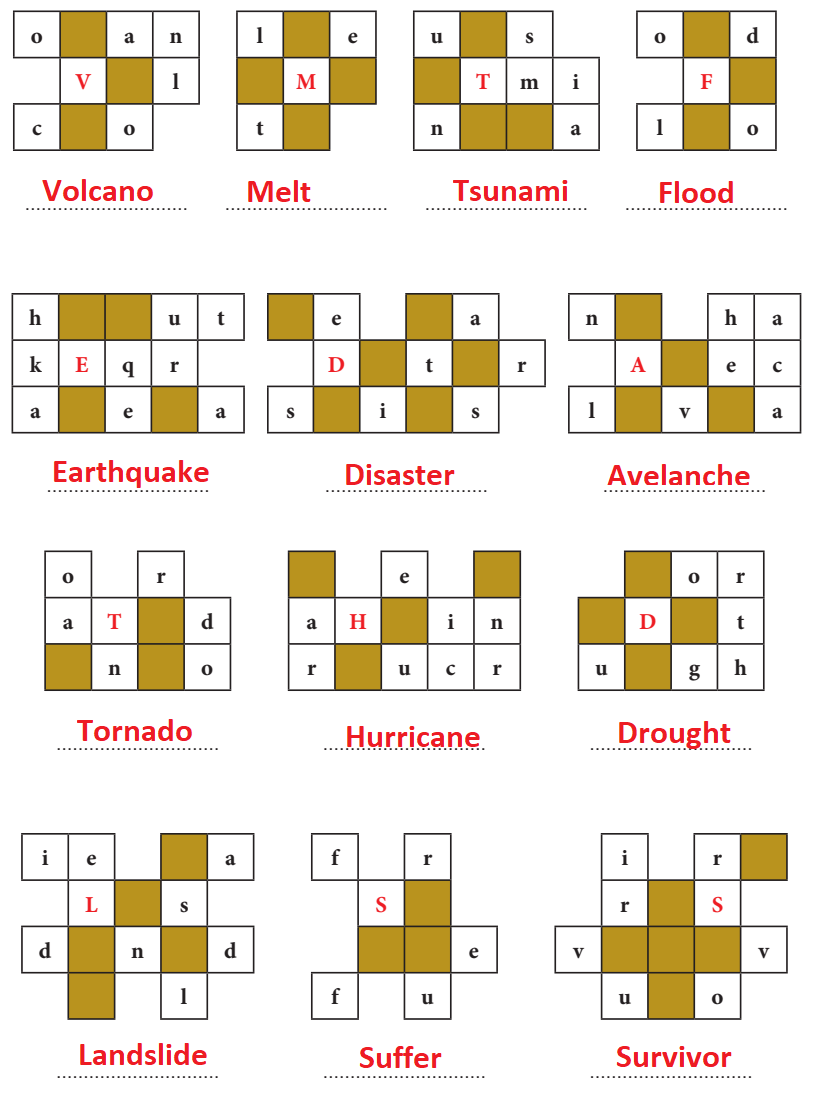
8. Sınıf İngilizce Ders Kitabı Sayfa 129 Cevapları MEB Yayınları
Activity 2 (2. Aktivite)
Match the questions with their answers. (There is one extra question.)
Çeviri: Onların yanıtları ile soruları eşleştir. (Bir soru daha var.)
Cevap:
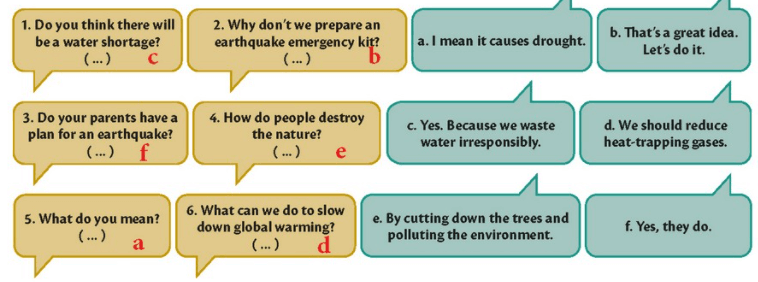
Activity 3 (3. Aktivite)
Listen to the recording and complete the sentences with a word or phrase.
Çeviri: Kaydı dinleyin ve cümleleri bir kelime veya deyimle tamamlayın.
Cevap:
1. Glaciers are _melting_ because of global warming.
2. Don’t throw plastics away; _recycle_ them.
3. Most of the African countries _suffer_ from food shortage.
4. In my opinion, there will be a water _shortage_ in the future.
5. We should slow down _global warming_ for the next generations.
Activity 4 (4. Aktivite)
Put the words/ phrases into the correct order.
Çeviri: Kelimeleri/ifadeleri doğru sıraya koyun.
Cevap:
1. We / down / shouldn’t / cut / trees / .
⇒ We shouldn’t cut down trees. (Ağaçları kesmemeliyiz.)
2. when / leave / turn off / You / the lights / should / your room / you / .
⇒ You should turn off the lights when you leave your room. (Odanızdan çıkarken ışıkları kapatmalısınız.)
3. should / We / water / wasting / stop / .
⇒ We should stop wsting water. (Su israfını durdurmalıyız.)
4. do / often / How / you / trees / plant / ?
⇒ How often do you plant tress? (Ne sıklıkla ağaç dikiyorsun?)
5. plastics / throw / Don’t / away / into the nature / .
⇒ Don’t throw away plastics into the nature. (Plastikleri doğaya atmayın.)
8. Sınıf İngilizce Ders Kitabı Sayfa 130 Cevapları MEB Yayınları
Activity 5.a (5.a Aktivite)
Read the brochure. Write a motto in the brochure.
Çeviri: Broşürü okuyun. Broşüre bir slogan yazın.
Cevap:
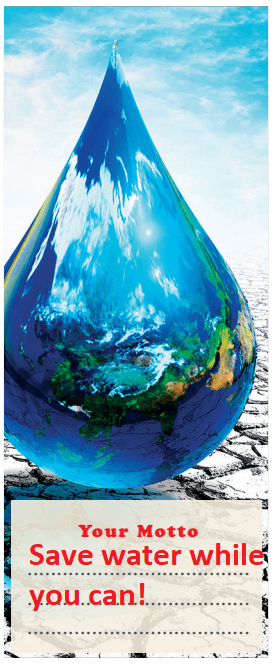
Activity 5.b (5.b Aktivite)
Fill in the blanks according to the brochure.
Çeviri: Broşüre göre boşlukları doldurunuz.
Cevap:
1. The source of the data is _NASA_ .
2. It is the worst drought of past _nine canturies_ .
3. The drought began in _1998_ .
4. The drought includes _Turkey_ .
5. There is a difference between _natural drought_ and _man-made drought_ .

- Ziyaretçi cevap yazdı | 14 Ekim 2023, 11:40
Haber raporlarını okurken bir şey anlamıştım. Burdan bakarken mantığını çözdüm galiba devamını ben getirdim. Bulmacada kafam takıldı mecvbur bir daha baktım.
